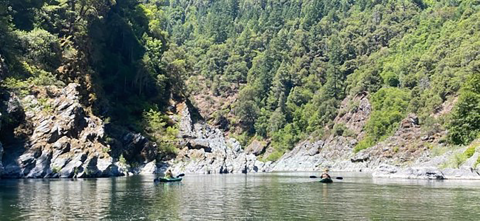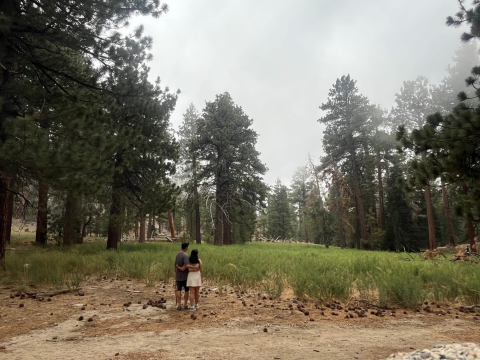Meet Stephanie Menjivar, a new fish and wildlife biologist at the Ventura Fish and Wildlife Office! Learn more about her journey to the Service and a project that makes her proud.
OB: Welcome to the U.S. Fish and Wildlife Service, Stephanie! What role do you play within the agency?
SM: Thank you, Olivia! It’s good to be here. I am a Fish and Wildlife Biologist for the South Coast Division, working on the Vandenberg-focused team. The job entails a great understanding of rocket launching effects on our listed species at Vandenberg Space Force Base and advocating for conservation and recovery where we can.
OB: Such interesting and important work! We’re glad to have you on the team. What led you to a career with the Service?
SM: I pursued a career with the Service because I loved that there was a government job with a mission that I would be happy to work under.
When I was in graduate school, my advisor reached out to a previous student of his named Lena Chang about opportunities for careers. Lena talked to me about the Service and the Directorate Fellowship Program (DFP), and that was pivotal for me. Once I became a DFP in the summer of 2021, meeting so many wonderful people and learning about the amazing work in Ecological Services really inspired and motivated me to join.
OB: It’s wonderful to hear that you were able to talk to Lena and that you enjoyed your DFP project! It is a great opportunity for aspiring conservationists to get their foot in the door with the Service. Can you tell us where did you go to school and what you studied?
SM: For my undergraduate degree, I went to Warren Wilson College out in Western North Carolina. The college sat in a mountain within the Appalachians, complete with farmland, a river, and forests all around. In my opinion, it was the perfect place to learn biology and ecology since a great number of theories could be tested on campus. I also have a minor in mathematics, but I don’t talk about that a lot.
For graduate school, I pursued my master’s close to home at California State University, Northridge. I was fortunate to have joined a lab where my advisor was passionate about my thesis. My thesis focused on noise pollution effects to Pacific chorus frog calling behavior. My advisor specialized in evolution and behavioral ecology, and his mode of study was primarily with crickets, so I was glad to be under his tutelage to understand bioacoustics and animal behavior. Even though I was in a cricket lab, I was able to pursue herpetology to my heart’s content.
OB: That sounds like a fascinating project! Can you tell us a little more about it?
SM: My graduate thesis was my little pride and joy. The project was about how traffic noise in Los Angeles affected the calling behavior of Pacific chorus frogs (Pseudacris regilla) and if the history of their population in urbanized areas had any influence on their bioacoustics. It was a lot of fun and a lot of work, staying up until 3am with undergraduate students and teaching them field ecology and herpetology while outside under the stars. Those times were unforgettable.
OB: That sounds like such a memorable experience! Thank you for sharing! Do you have any conservation heroes or mentors?
SM: I feel like I have so many conservation heroes and mentors. They all either work for the Service or have retired from the Service. I have been inspired time and time again by the people I work with and see how passionate they are for their resources.
OB: Agreed, the Service has some of the most dedicated and passionate people in the business! What is your opinion on the importance of diversity in conservation?
SM: I find that diversity in conservation is SO important. We put so much emphasis on biodiversity in conservation, so does it not make sense to include diversity in the Service as well? Just like how a healthy ecosystem needs biodiversity, so does the field of conservation.
OB: That is such a good point. We need diversity everywhere. What are your thoughts on the concept that “the outdoors is for everyone”?
SM: I truly believe that the outdoors is for everyone if they have the capacity to respect nature. I fear that there is a great disconnect between people and nature nowadays because green spaces aren’t always available to people, especially in low-income areas. Being in the outdoors can be so good for your mental and physical health. I know that nothing centers me more than listening to the sound of rivers and streams, and I just wish more people could experience how comforting nature can be.
I love nothing more than teaching children and people about wildlife and watching them fall in love with nature.
OB: Thank you for sharing your love of nature with others and helping them discover it for themselves! That is so important in making sure the outdoors is for everyone. So Stephanie, how do you spend your free time?
SM: I like to spend my free time reading books and doing archery!
OB: Incredible! We will need to swap book recommendations soon. Lastly, do you have a hidden talent?
SM: According to my husband, I am an amazing baker. I’m not sure if that talent is hidden since people eat my baking… but I do enjoy making people smile with the food I make!
I’d like to think that my real hidden talent is being a really good Game Master for Dungeons and Dragons.
OB: I always love meeting a fellow baker! And being a Game Master for Dungeons and Dragons sounds incredibly fun! Thank you, Stephanie!




